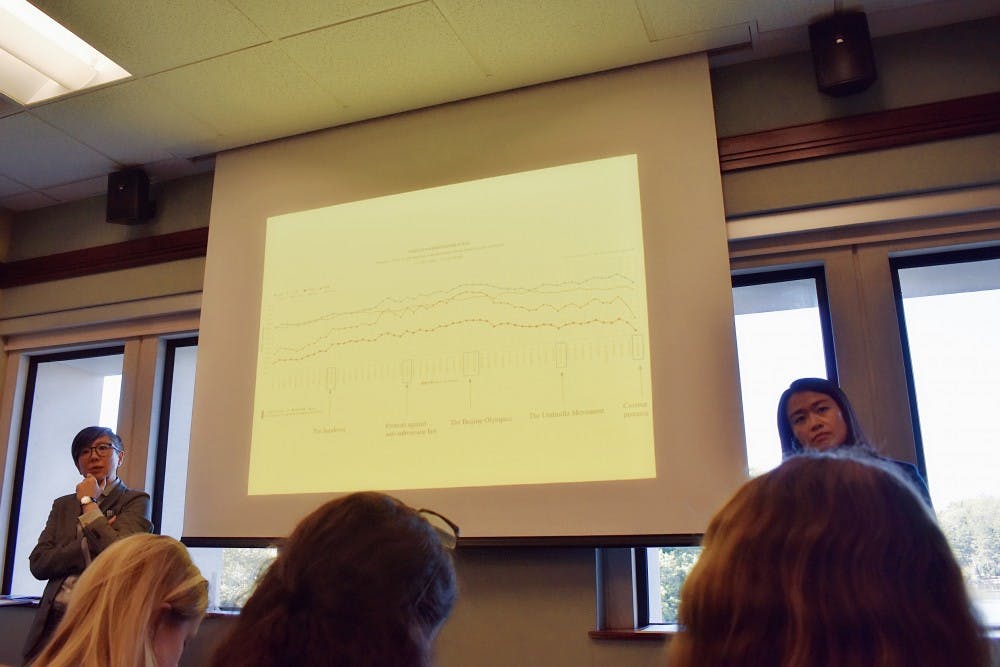Tze Loo, associate professor of history and international studies, and Dan Chen, assistant professor of political science, spoke at the Protests in Hong Kong Teach-In on Wednesday, Oct. 23, which aimed to help students understand the historical origins and political evolutions of the Hong Kong protests.
The event attracted about 60 students and faculty, filling the classroom.
The 2019 Hong Kong protests, which were triggered by the extradition bill proposed in late March that would have allowed criminal suspects to be extradited to mainland China, have been going on for seven months. Tens of thousands of teenagers in Hong Kong have taken to the streets during this period. Hong Kong's legislature withdrew the bill on Oct. 23.
But news media tend to go to the “pro-democracy” label very quickly, Loo said, and fail to capture the larger context that would help people make sense of these protests, or understand what the stakes are for the people protesting in Hong Kong.
Both during the interview and the teach-in, Loo emphasized that the purpose of the event was purely to provide information.
“This teach-in is not about taking sides,” Loo said. “We are not interested in persuading anyone of any position. We are also not going to make any predictions.”
Chen said that Carrie Lam, Chief Executive of Hong Kong, has said she enacted the extradition bill to bring back Chan Tong-kai, the Hong Kong citizen who had murdered his girlfriend on their trip to Taiwan. Chan confessed to Hong Kong police that he had strangled his girlfriend, according to The New York Times, and became the subject of a local crime story.
“This is where perception matters — Hong Kong citizens perceive this action very differently,” Chen said. “[They believe] if the extradition bill were to be passed, anyone in Hong Kong can also be extradited to mainland China for trial.”
The Hong Kong protests in 2019 were the largest protests in scale, but they were not the first protests to happen in Hong Kong. There were the 2003 protests against the Anti-Subversion Law, and the Umbrella Movement in 2014 against the central government nominating Hong Kong’s chief executives, Chen said.
“When the promise of autonomy Hong Kong would receive from central government and Hong Kong people’s perception about how much autonomy they actually received does not align, protests happen,” Chen said.
The older generations of Hong Kong residents, who used to be milder and measured during protests, now realize that their sons and daughters are taking to the streets asking for democracy, so there is more sympathy for the younger generation’s action among the older generation, Chen said.
“In recent years, the young people in Hong Kong predominantly saw themselves as Hong Kongers instead of Chinese,” Chen said.
Enjoy what you're reading?
Signup for our newsletter
Chen said the protests persisted even after the extradition bill was fully withdrawn by Carrie Lam.
“The protesters had already achieved their original goal, and now they are protesting for no clear reason,” Senior Sherry Zhu said.
Stanley Chan, an exchange student from the University of Hong Kong, talked about what he perceived as the demands of Hong Kong youth.
“[The young people in Hong Kong] want to end police violence, systemic violence and stop the [Chinese] government’s interference with Hong Kong,” he said.
Loo spoke about historical reasons for Hong Kong’s significance to China, which had much to do with Hong Kong being a British colony from 1842 to 1997.
China experienced a “Century of Humiliation,” where China became the victim of Western and Japanese imperialism after being defeated in the First Opium War. In the Treaty of Nanjing in 1842, which marked the end of the First Opium War, China ceded the territory of Hong Kong to Britain.
This was the century of China’s political and military weakness and humiliation, Loo said, and it resulted in the trauma of China’s sovereignty and territory.
“After the Communist Party’s victory in 1949, there was a strong desire for territory unification, and a strong desire of a strong country, carried over from that period to today,” Loo said.
China wanted Hong Kong back immediately after the 99-year lease of the New Territory of Hong Kong to Britain expired in 1997. Under political leader Deng Xiao Ping’s “one country, two systems” idea, “Hong Kong Basic Law” will remain unchanged for 50 years until 2047. The idea also led to Hong Kong's official name — Hong Kong Special Administrative Region — and its autonomy.
Senior Lavinia Deng, an international student from China, said it was sad to see what has been happening in Hong Kong.
“I’m from a city two hours away from Hong Kong and used to visit there frequently,” Deng said. “What’s happening right now is breaking my heart.”
First-year student Simon Curry attended the event for class extra credit, but Curry said he would have been interested in going to this event nonetheless.
“It is kind of awesome how many people are here and additionally how different we all are,” Curry said. “It speaks to how a wide array of our campus cares about what’s going on in the world and Hong Kong specifically.”
Loo encouraged students to read from different news media, including Asian newspapers, which would offer a different perspective from the western media.
“It would be interesting to compare,” Loo said, “and what gets picked up by the news media of one side is not always the whole story.”
Contact news writer Haley Zhao at haley.zhao@richmond.edu.
Support independent student media
You can make a tax-deductible donation by clicking the button below, which takes you to our secure PayPal account. The page is set up to receive contributions in whatever amount you designate. We look forward to using the money we raise to further our mission of providing honest and accurate information to students, faculty, staff, alumni and others in the general public.
Donate Now


